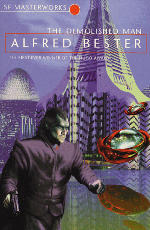| Naše
izdanje
Alfred
Bester |
| The
Demolished Man
Alfred Bester The Demolished Man takes place in a future where a small
percentage of the population has developed telepathic powers. Called
peepers, they have revolutionized business, government, and, most
importantly, law enforcement. In fact, peepers have been so
effective that no one has successfully committed an act of
premeditated murder in more than 70 years. So Lincoln Polwell,
Prefect of the Psychotic Division, is somewhat astonished to be
summoned to a popular socialite's home to investigate both a murder
and a disappearance.
One of Madame Beaumont's guests, an important businessman named
Craye D'Courtney, has been murdered, and his daughter is missing.
While there is no hard evidence, Polwell's principal suspect is Ben
Reich, D'Courtney's chief competitor. His hunch is based on a slip
of the tongue made by Reich, and an illicit peek into Reich's
thoughts. For Polwell is a peeper, and while he can use his
abilities to gain special insights into cases, he still needs to
gather evidence to make a case.
What ensues is a complicated game of manoeuvring, evasion, and
deception, as Reich and Polwell square off against one another. The
game is a very interesting one, because while Reich is a very rich
man and has considerable resources, Polwell has an entire network of
peepers to help him gather information and obtain evidence. If
Polwell wins their cat-and-mouse game, Reich is headed for
Demolition, the most serious punishment society can inflict. If
Reich wins, he gets away with the impossible. The best part of Bester's story is its timelessness. The
Demolished Man is essentially a murder mystery, with a cunning
villain and a relentless detective in pursuit. There are few
references to outlandish or dated technology (with the exception of
a punch card computer!) or outrageous social practices or fashions.
While Bester's future isn't utopia, neither is it a post-apocalyptic
nightmare. Too often science fiction tends to paint the future
either too bright or too bleak. Bester extrapolates his view of the
50s forward in time, recognizing that while things like technology
will change, basic human nature will not. The story is mostly about
ESPers and their effect on a modern society. Bester's vision is one
where ESPers have a code of ethics and responsibility, much like
doctors or lawyers. Even though his peepers can read the minds of
unwilling individuals, they are forbidden to do so outside of a
court of law. It's comforting to see that Bester's vision of the
future includes the same series of checks and balances as our modern
system of justice. The Demolished Man is a welcome change for those tired of
modern trilogies and series. It's a simple, refreshing book that's
worth a look while you're waiting for your favourite author to
finish off the final chapter in their latest series. Enjoy! |
 We
tend to forget, as we wait for the latest from our favourite
authors, that there are decades worth of science fiction and fantasy
literature to choose from. Even the best libraries cannot keep
collections extensive enough to include all of the literary
treasures out there. Fortunately, publishing houses occasionally
offer reprints of the very best (and used bookstores can help you
find the rest). The Orion Publishing Group has created the SF
Masterworks series, a collection of some of the best SF
novels from the last 60 years. Alfred Bester's The Demolished Man
(1953) is the 14th book in the SF Masterworks
series.
We
tend to forget, as we wait for the latest from our favourite
authors, that there are decades worth of science fiction and fantasy
literature to choose from. Even the best libraries cannot keep
collections extensive enough to include all of the literary
treasures out there. Fortunately, publishing houses occasionally
offer reprints of the very best (and used bookstores can help you
find the rest). The Orion Publishing Group has created the SF
Masterworks series, a collection of some of the best SF
novels from the last 60 years. Alfred Bester's The Demolished Man
(1953) is the 14th book in the SF Masterworks
series.